|
It starts simply enough. In (then) modern day Milan, middle-aged and widowed office worker Amanzio Berzaghi (Raf Vallone) walks into central police headquarters to plead with Commissioner Duca Lamberti (Frank Wolff) and his assistant Mascaranti (Gabriele Tinti) to find his little girl, Donatella (Gill Bray). He tells them that she has been missing now for over a month, and with the officers at his local police station failing to make progress, he has made the decision to go over their heads. That's how it works in modern day Italy, he soberly notes, prompting a revealing smile from Mascaranti. When Lamberti asks the child's age, Berzaghi unexpectedly tells him that she's 25, but qualifies his concern by revealing that, due to a defect at birth, she still has the mind of a three-year-old. But there's more. An aspect of Donatella's condition is that she will sleep with almost any man she encounters and will do whatever they ask, which is why Berzaghi has gone to considerable trouble to prevent her from being able to leave the house when he is at work, and why he cannot understand how she has disappeared. After consulting his files, Lamberti confirms that Donatella's picture has been circulated to every police station in Italy, but also that no-one is actively searching for her, for the simple but frankly worrying reason that thousands of girls disappear from their homes in Italy every year. After accompanying Berzaghi back to his apartment and questioning him further, Lamberti and Mascaranti head back to the office, on the way discussing whether to take the case. Despite Mascaranti's suspicion that Donatella has been pulled into prostitution, which would technically make this a job for the Vice Squad, Lamberti is moved by Bezaghi's torment and decides that he and Mascaranti should investigate Donatella's disappearance instead.
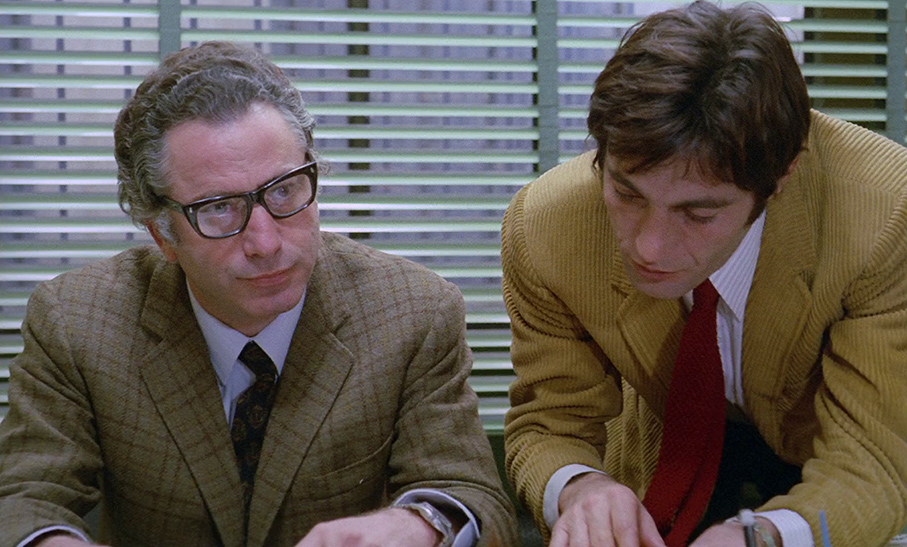
What follows is effectively a police procedural, one in which we stick with Lamberti and Macaranti as they begin the often thankless task of trying to discover what happened to the missing Donatella. By then, we've got to know her a little through visualised flashbacks of information provided about her by her father, from her infant-like devotion to him to her almost innocent desire for male sexual attention. Although much of the investigation is done by the book, the detectives aren't above breaking a few rules to procure the cooperation of unwilling potential informants. We're first clued into this when an attractive woman (Eva Renzi) enters a car dealership run by a smooth operator named Salvatore (Gigi Rizzi), whom she charms into accompanying her on the test drive of an expensive car, only to hop out of the vehicle at an opportune moment and cheekily thank him for the lift. By the time he returns to the dealership, Lamberti and Mascaranti have made themselves comfortable inside, where they greet Salvatore revealingly with the telling words, "Ciao, pimp." It quickly emerges that Salvatore spent two years in jail for recruiting young women to work in local underground brothels, and while he claims to have since gone straight, the two detectives aren't buying that for a second. Lamberti reveals that he and Mascaranti intend to visit as many of these brothels as they can posing as clients with Salvatore as their guide. Despite Salvatore's continual denials, the detectives eventually secure his assistance through a combination of verbal and physical intimidation and the threat of arrest for a package of cocaine found in a showroom car, which was planted there on the test drive by the attractive woman, who it turns out is Lamberti's wife.
On the surface, at least, the 1970 Death Occurred Last Night (an accurate enough translation of the Italian original La morte risale a ieri sera) is an early example of the poliziotteschi, a particularly Italian subgenre of crime and action movies that reflected the social instability and high crime rate in Italy of the day and drew influence from the edgier cop and crime films of the 60s and early 70s from France and America. Yet despite being initially told almost exclusively from the viewpoint of the investigative detectives, this proves to be an altogether more story-driven and character-centric work than what later became the subgenre norm. Indeed, the first half of the film is almost completely free of action, being focussed instead on the sometimes frustrating grind that investigating such a case can become. Here, doubtless as in real life, useful information does not come easily, with small clues and possible leads only discovered through dogged persistence and the odd bit of morally questionable rule-breaking, and even then it may provide no concrete answers. Lamberti even takes the notion of bringing your work home with you to a whole new level when a black sex worker admits to having seen Donatella but is reluctant to say more, and Lamberti places her in protective custody in the spare room at his house. Unsurprisingly, this does not go down too well with his wife.
Given the undramatic and unsensational nature of the investigation and the screen time devoted to it, you could be forgiven for expecting it to be a tad pedestrian, and possibly even a little dull. It never is. It's a testament to the screenplay by Biagio Proietti and director Duccio Tessari (based on the novel of the same name by Giorgio Scerbanenco), the engaging leads, and a supporting cast littered with interesting faces, that even the more mundane aspects of the investigation make for oddly compelling viewing. And then there's Tessari's direction and Lamberto Caimi's camerawork, a constantly shifting mix of two distinctively different styles, with locked-down and smoothly executed dolly shots regularly giving way to sometimes deliberately twitchy handheld work. At times, this feels almost like the work of two differently inclined directors that really should clash, but instead they end up melding and even complimenting each other.
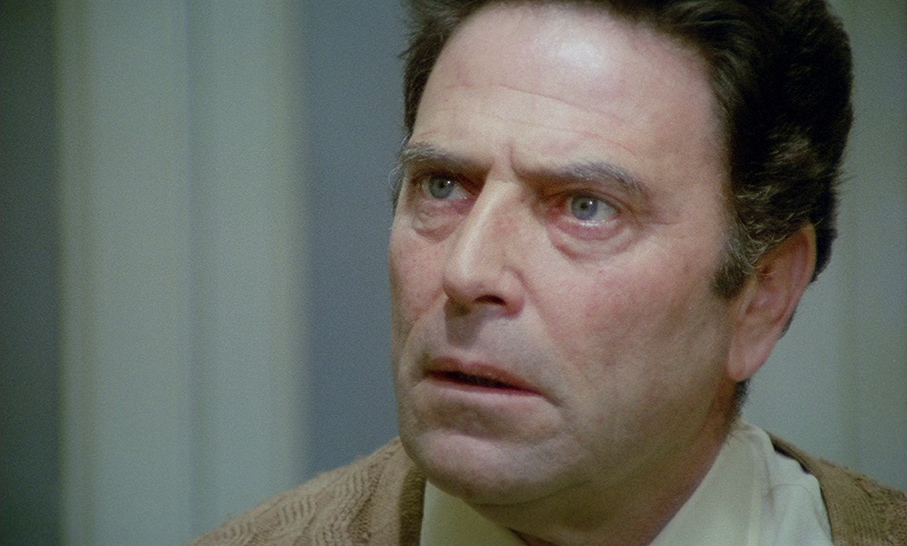
Then, at around the halfway point, there's a plot revelation that changes the course of the subsequent narrative, one that I'd normally be tiptoeing around to avoid delivering spoilers, were if not strongly alluded to in the bloody title. I mean, when you're watching a film called Death Occurred Last Night and the story revolves around the search for a missing girl and nobody dies in its first 50 minutes, I can't be the only one who is not completely surprised when we find out she's been murdered, an event that is also included in almost every plot synopsis I have read. That said, the discovery of her body is still a jarring event, in part for the specifics of where she is found, and a short while later for the yelp-inducing glimpse we get of her injuries, when her feet are uncovered at the morgue so that her distraught father can identify her, presumably to avoid him having to see what happened to her body and face.
From here on in, the previously singular narrative divides to follow two separate but thematically connected paths. As the police investigation switches from a missing person case to the hunt for a murderer, a chance event provides Berzaghi with an important clue to the killer's possible identity. Instead of taking it to Lamberti and Mascaranti, however, he embarks on his own investigation, having convinced himself that he needs to be the first to see the face of his daughter's killer. Initially, at least, the approaches of the two parties differ in intriguing ways, as Mascaranti brutally beats information from a suspect while Lamberti looks dispassionately on, unaware that Berzaghi has learned more using the sort of quietly methodical enquiries you'd normally expect of an investigating detective. As Berzaghi gets closer to a possible answer, however, his calm exterior starts to give way to angry desperation, and long before we reach the final scene it seems likely that this is not going to end well for anyone.
I was hooked from an early stage by Death Occurred Last Night and remained gripped by it right up to its sobering finale. Tessari's direction, in organic collaboration with Lamberto Caimi's cool-toned lighting camerawork and Mario Morra's tight, waste-free editing, keep the narrative moving at a lick even through the more theoretically mundane aspects of the investigation, and really ups the pace during the more action-oriented scenes in the film's breezy second half. Savvy casting also helps no end here. Frank Wolff – a familiar face outside of Italy for key roles in Once Upon a Time in the West (Sergio Leone, 1968) I Am Santana, Your Angel of Death (Giuliano Carnimeo, 1969), and Cold Eyes of Fear (Enzo G. Castellari, 1971) – makes for a solid and convincing investigative detective, and is the only character whose home life also plays a key part in the drama. As his sidekick Mascaranti, the seriously busy Gabriele Tinti (this was one of five films he shot in 1970 alone) makes for a good-humoured but morally questionable symbol of a new generation of detectives, men who wear their hair longer but are far less tolerant to the criminals they hunt than the compassionate Lamberti. Perhaps the most subtly effective performance comes from Raf Vallone as Amanzio Berzaghi, whose fear for the safety of his daughter gives way first to touching sadness – movingly realised as he clears all of his dead daughters things from her room and takes them outside for garbage collection – and later a grim determination to confront Donatella's murderer.
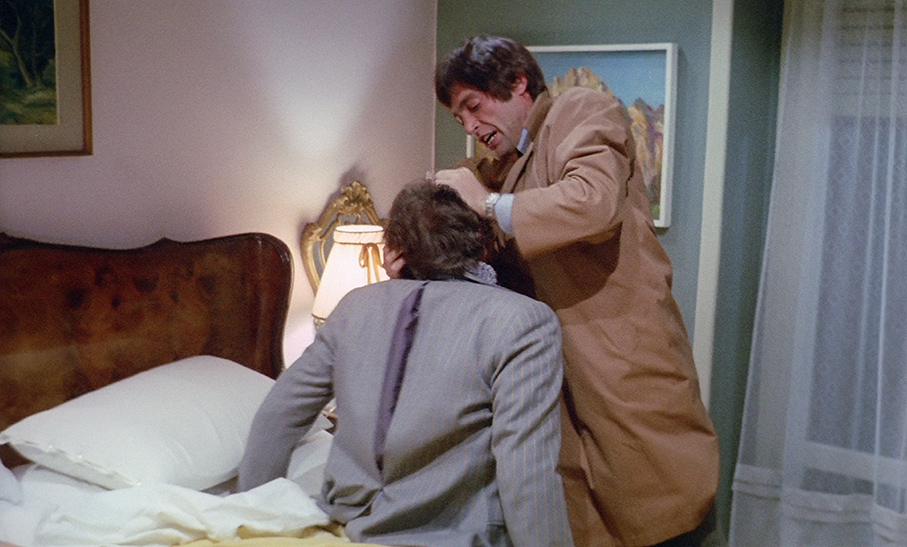
Death Occurred Last Night confirms Duccio Tessari as a director whose work I really need to see more of, the only other film of his with which I am familiar being the 1971 The Bloodstained Butterfly, a riveting mix of murder mystery, police procedural and courtroom drama. Just as that film incorporates elements of the giallo thriller into a more complex and layered multi-genre work, Death Occurred Last Night takes the bones of the poliziotteschi – a subgenre that at this point was still in its infancy – and fleshes it out into a richly textured and character-driven work that is genuinely hard to pin down to a single genre. Despite Gianni Ferrio's sometimes over-strident music score, the result is a compelling but ultimately sobering watch, an intelligently handled and convincingly acted deglamorization of the process of police investigation and an unflinching correction to the traditionally cathartic nature of cinematic tales of vengeance.
The result of a 1080p HD transfer (and, I have to presume, restoration) from the original camera negative, the image quality on this Radiance Blu-ray is close to sublime. Framed in the film's original theatrical ratio of 1.66:1, every aspect of this transfer is pleasing to the eye, from the crisply rendered detail to the generously graded contrast range, and particularly the handsome presentation of the film's pastel-leaning colour palette. As you'd hope, there's hardly a dust spot or trace of damage to be seen, and a fine film grain is visible throughout. Terrific.
Italian films of this period often had their dialogue dubbed in post-production, and Radiance has included both the Italian and English language tracks here, each of which is presented in Linear PCM 1.0 mono. Usually, I wince at English dubs of Italian films, but was genuinely astonished here by how well both dubs seem to match what the actors were saying when the cameras rolled, making me wonder at one point if two alternate versions were shot at the same time, with the actors performing each take in both languages. As the film progresses, some more obvious audiovisual mismatches make it clear this was not the case, and screen grabs from both versions at specific timestamps are always identical. I'd argue that Italian original is still the best and most authentic of the two (the American voice artists do a decent job, but often lack the subtlety and nuance of the Italian actors), but even so, kudos to whoever was in charge of the English dub.
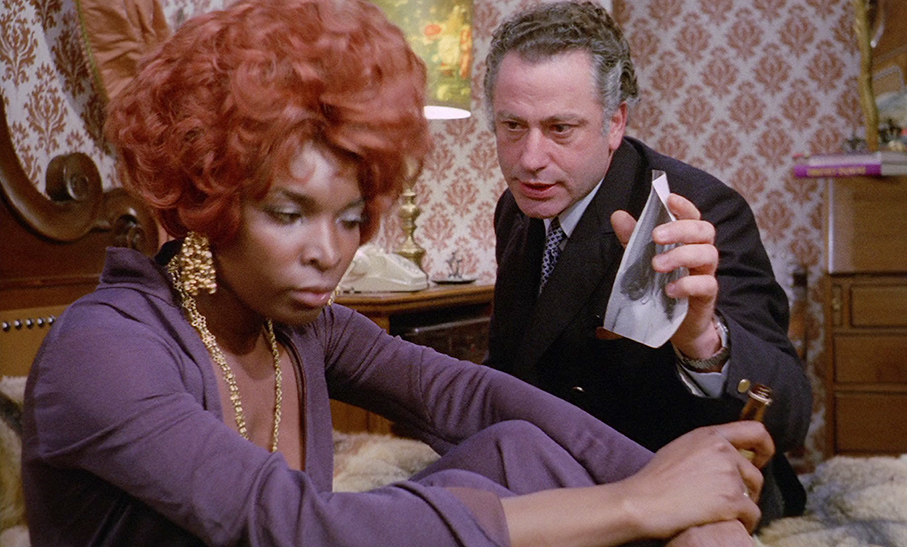
The audio quality itself is not quite up to the high standards set by the picture. The tonal range of both tracks is unsurprisingly narrow, which can make the music sound a tad shrill if played at a high volume, and there is some background hiss and crackle, which is slightly more audible on the Italian track, though I only really noticed in on the quieter scenes. A slightly more pronounced crackle can be heard at a couple of the reel changes, but it doesn't last long and is not loud enough to be distracting. The dialogue is always clear, however, though a little more robust on the English language track than the Italian original, and most of the time the hiss and crackle are rendered inaudible by the soundtrack itself, and are thus not an issue.
Optional English subtitles are provided for the Italian soundtrack, plus optional English subtitles for the hearing impaired for the English soundtrack. Full marks for including them both.
Archival interview with Chris Alexander (7:12)
Less an interview than a self-shot address to camera by filmmaker and editor of Fangoria magazine, Chris Alexander, who is clearly a fan of a Death Occurred Last Night, a film he nicely describes as being neither giallo nor poliziotteschi while at the same time kind of both. He explores what makes Duccio Tessari interesting as a filmmaker, and highlights the work of the film's uncredited and insanely prolific producer Artur Brauner, particularly two 1971 films he produced for Jesús Franco, Vampyros Lesbos and She Killed in Ecstasy (Sie tötete in Ekstase). He has some interesting things to say about Gianni Ferrio's divisive music score, and cautions that the film is ultimately a downer and its message is that the world is a cesspool. You have been warned.
Audio Essay by Francesco Massaccesi (11:06)
Written by producer and writer Francesco Massaccesi, and narrated by filmmaker and scholar Howard S. Berger, this is a fascinating look at the socio-political situation in post-war Milan and how the corruption, terrorism and crime of the period was eventually reflected in Italian cinema. The impossibility of classifying this film is discussed, as is the character of Lamberti and the author of the source novel, Giorgio Scerbanenco.
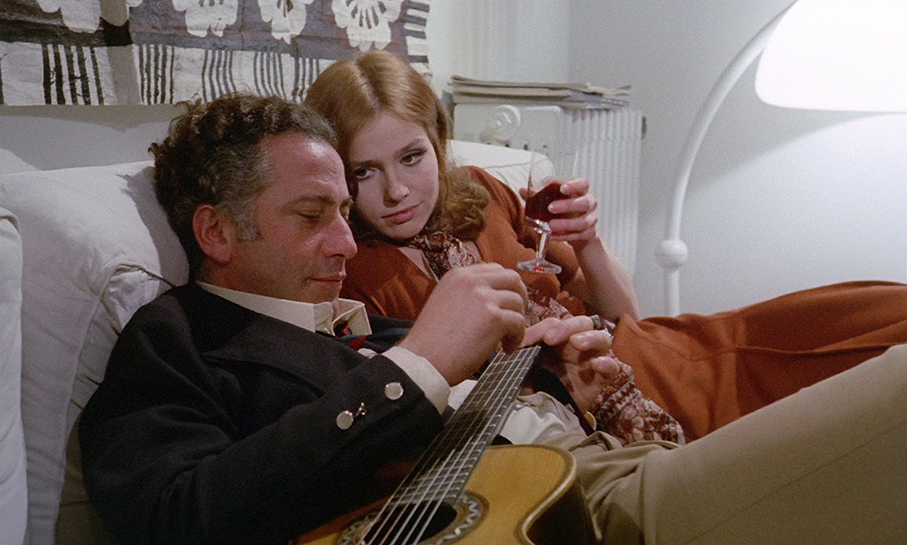
Trailer (2:38)
The original trailer for the American release, and frankly one of the most creative of its kind I've seen in a long while. Constructed from a mixture of film clips, stills, filtered imagery and graphics, often presented on a three-way split screen, the main characters are all introduced as monochrome identikit photos, one facial feature at a time, a really neat idea that I'm now itching to copy. A soundtrack featuring one of those deadly serious 1970s narrators is accompanied by Gianni Ferrio's score. I really liked this, and salute its inclusion.
The release disc also includes a Limited Edition Booklet by David Sodergren, but this was not available for review.
A compelling, not easily classifiable blend of police procedural, poliziotteschi, and giallo-influenced revenge drama is given handsome presentation on this new Blu-ray from Radiance. The transfer is excellent, and while the on-disc special features are small in number, all are top notch, including – and I rarely say this – that theatrical trailer. Highly recommended.
Bibliography
https://en.wikipedia.org/wiki/Poliziotteschi |